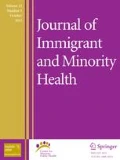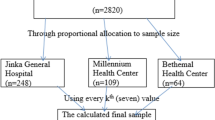Abstract
The mortality rate of breast cancer has increased in worldwide and reported first rank of women cancer in Thailand. One an urgent concern of prevention and education on early detection is Breast Self-examination (BSE). This study aims to report the percentage of BSE and examine the associated factors with BSE among Akha women, the largest ethnic group in northern part of Thailand. A study was conducted with 296 Akha women by survey quantitative data. Descriptive statistic and Binary regression were used for analysis. The majority of the participants were 45–59 years old (51.70%), and illiterate (68.90%). The percentage of good BSE founded 19.60%. The participants who received breast information showed zero-point one three time more likely to report good BSE compared to those non receiving (OR 0.13; 95% CI 0.03–0.53). Factor of susceptibility, benefit of BSE, barrier of BSE, and BSE confident were association with BSE practice. Based on findings, we recommend implementing a new practical program such as BSE media in Akha Language to promote BSE in this ethnic group.
Similar content being viewed by others
References
Organization WH. Cancer Country Profiles-Thailand. Geneva: WHO; 2014.
Rana P, Ratcliffe J, Sussman J, Forbes M, Levine M, Hodgson N. Young women with breast cancer: needs and experiences. Cogent Med. 2017;4(1):1278836.
Attasara P, Buasom R, Kookiang J. Hospital based cancer registry annual report 2012. National Cancer Institute Thailand. 2014, p. 1–84.
Regional differences in burden of disease in Thailand. Disability-Adjusted Life Years: DALYs. Burden of diseases. 2012.
Cedolini C, Bertozzi S, Londero AP, Bernardi S, Seriau L, Concina S, et al. Type of breast cancer diagnosis, screening, and survival. Clin Breast Cancer. 2014;14(4):235–40.
Thainuea V. The effectiveness of regular breast self examination combined with BSE record handbook utilization in early detection of breast cancer in Thailand: a cohort study. Mueang Nonthaburi: Ministry of Public Health; 2016.
Thaineua V, Ansusinha T, Auamkul N, Taneepanichskul S, Urairoekkun C, Jongvanich J, et al. Impact of regular breast self-examination on breast cancer size, stage, and mortality in Thailand. Breast J. 2019;26:822.
Carlson KJ, Eisenstat SA, Ziporyn TD. The new Harvard guide to women’s health. Cambridge: Harvard University Press; 2004.
Kress RPM, Path JE, Eduardo Abalo M, Antonio LM. Breast cancer thirty years later: a comparative study between a 1983–1984 and a 2012–2013 cohorts of argentine women. J Can Epi Treat. 2017;1(3):1–10.
Gupta R, Gupta S, Mehrotra R, Sodhani P. Risk factors of breast cancer and breast self-examination in early detection: systematic review of awareness among Indian women in community and health care professionals. J Public Health. 2019;24(1):118–31.
Taleghani F, Kianpour M, Tabatabaiyan M. Barriers to breast self-examination among Iranian Women. Iran J Nurs Midwifery Res. 2019;24(2):108–12.
Department of Provincial Administration. Number of hill tribe population in Chiang Rai. 2015.
Apidechkul T, Laingoen O, Suwannaporn S. Inequity in accessing health care service in Thailand in 2015: a case study of the hill tribe people in Mae Fah Luang district, Chiang Rai, Thailand. J Health Res. 2016;30(1):67–71.
Highland Development Health Center. Health Status survey of hill tribe. 2004.
Highland Development Health Center. Hmong population structure and health status. 2005.
Mohamed HAE-A, Ibrahim YM, Lamadah SM, Hassan M, El-Magd A. Application of the health belief model for breast cancer screening and implementation of breast self-examination educational program for female students of selected medical and non-medical faculties at Umm al Qura University. Life Sci J. 2016;13(5):21–33.
Tailor HJ, Patel MM, Italiya SL. Breast or cervical cancer screening programme: which one needs to stress in changing trend? Why. Natl J Community Med. 2016;7:338–42.
Yılmaz M, Durmuş T. Health beliefs and breast cancer screening behavior among a group of female health professionals in Turkey. J Breast Health. 2016;12(1):18.
Connor AE, Visvanathan K, Baumgartner KB, Baumgartner RN, Boone SD, Hines LM, et al. Pre-diagnostic breastfeeding, adiposity, and mortality among parous Hispanic and non-Hispanic white women with invasive breast cancer: the Breast Cancer Health Disparities Study. Breast Cancer Res Treat. 2017;161(2):321–31.
Rakkapao N, Promthet S, Moore MA, Hurst CP. Development of a breast cancer awareness scale for Thai women: moving towards a validated measure. Asian Pac J Cancer Prev. 2016;17(2):851–6.
Talley CH, Yang L, Williams KP. Breast cancer screening paved with good intentions: application of the information–motivation–behavioral skills model to racial/ethnic minority women. J Immigr Minor Health. 2017;19(6):1362–71.
Farhadifar F, Molina Y, Taymoori P, Akhavan S. Mediators of repeat mammography in two tailored interventions for Iranian women. BMC Public Health. 2016;16(1):149.
Nadalin V, Maher J, Lessels C, Chiarelli A, Kreiger N. Breast screening knowledge and barriers among under/never screened women. Public Health. 2016;133:63–6.
Williams KP, Templin TN, Hines RD. Answering the call: a tool that measures functional breast cancer literacy. J Health Commun. 2013;18(11):1310–25.
Kwok C, Ogunsiji O, Lee CF. Validation of the breast cancer screening beliefs questionnaire among African Australian women. BMC Public Health. 2015;16(1):117.
Dehdari T, Rahimi T, Aryaeian N, Gohari MR. Effect of nutrition education intervention based on Pender’s Health Promotion Model in improving the frequency and nutrient intake of breakfast consumption among female Iranian students. Public Health Nutr. 2014;17(3):657–66.
Dagne AH, Ayele AD, Assefa EM. Assessment of breast self-examination practice and associated factors among female workers in Debre Tabor Town public health facilities, North West Ethiopia, 2018: Cross-sectional study. PLoS ONE. 2019;14(8):e0221356.
Faist T. Transnationalization in international migration: implications for the study of citizenship and culture. Ethn Racial Stud. 2000;23(2):189–222.
Satitvipawee P, Promthet S, Pitiphat W, Kalampakorn S, et al. Factors associated with breast self-examination among Thai women living in rural areas in Northeastern Thailand. J Med Assoc Thai. 2009;92:S29.
Özmen T, Yüce S, Tekin Güler CU, Özaydın N, Pruthi S, Akkapulu N, et al. Barriers against mammographic screening in a socioeconomically underdeveloped population: a population-based, cross-sectional study. J Breast Health. 2016;12(2):72.
Acknowledgements
Firstly, we would like to sincerely thanks to College of Public Health, Chulalongkorn University and Mae Fah Luang University. Furthermore, the authors would like to express gratitude to the 90th Anniversary of Chulalongkorn University Scholarship for supporting fund for conducting this study. Finally, we would like to express our deepest gratitude for study participants and research assistants.
Funding
The 90th Anniversary of Chulalongkorn University Scholarship (Batch# 39, Round 2/2018).
Author information
Authors and Affiliations
Corresponding author
Additional information
Publisher's Note
Springer Nature remains neutral with regard to jurisdictional claims in published maps and institutional affiliations.
Rights and permissions
About this article
Cite this article
Suwannaporn, S., Chuemchit, M. Breast Self-examination Among AKHA Women (Hill Tribe Group) in Chiang Rai, Thailand. J Immigrant Minority Health 24, 666–672 (2022). https://doi.org/10.1007/s10903-021-01246-z
Accepted:
Published:
Issue Date:
DOI: https://doi.org/10.1007/s10903-021-01246-z




